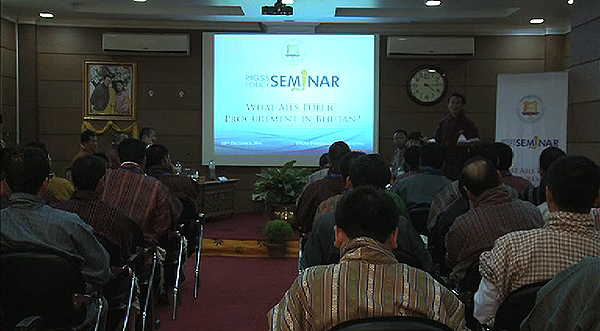 The World Bank ranks Bhutan as one of the countries in the region with best public procurement system. But when it comes to its implementation, there’s still much more to do. So brainstorming on the issue, a policy seminar was held at the Royal Institute for Governance and Strategic Studies (RIGSS) in Phuentshogling, on Saturday.
The World Bank ranks Bhutan as one of the countries in the region with best public procurement system. But when it comes to its implementation, there’s still much more to do. So brainstorming on the issue, a policy seminar was held at the Royal Institute for Governance and Strategic Studies (RIGSS) in Phuentshogling, on Saturday.
According to the Finance ministry, lack of procurement capacities for both the procuring agencies and suppliers is what ails the public procurement in the country. Procurement is an emerging profession with its cadre in the civil service introduced just about a decade ago.
The officiating finance secretary Lekzang Dorji said improper planning is another challenge to an efficient procurement.
“No one holds, in fact the degree or masters qualification in procurement. When we took 60 procurement officers with the introduction of the cadre, they were accountants, administrative officers, storekeepers or health pharmacists”. So he said because of lack of capacity, there is lack of procurement planning which results in lot of wastage of resources.
As the National Council recommended during its recent session, the Finance ministry also feels a need for a Procurement Act. But for now, after an extensive debate, the joint sitting of the Parliament has pushed the discussion over the need of such an act to the next session.
Speaking at the seminar, the Chairperson of the Anti-Corruption Commission Kinley Yangzom said procurement is one area where risk of fraud and corruption is high. The Annual Audit Report 2015 revealed more than Nu 420 M as irregularities in procurement. The Chairperson added the finance ministry and ACC are drafting a debarment rule and it’s under review.
The Royal Audit Authority reported procurement without tender and quotation, improper evaluation of bids and excessive payments among others are some major procurement issues in the country today.
The Royal Civil Service Commission’s Chairperson, Dasho Karma Tshiteem, said with a system in place already, there is a need to strike an all-inclusive balance.
“Procurement is complex and I think it requires mainly players to come together. If you want to be a country like Singapore, then you have to have not only rule which are good but also people who implement it with integrity and private sector also should build their system in integrity and not just quality of work”.
The RIGSS organised the policy seminar to unravel the mystery of system that leads to huge wastage of public expenditure and create the initial spark for creative policy responses to improve the public procurement process in the country.
A review report by the National Council on the public procurement system shows, in some of the dzongkhags, expenditures on procurement constitute 40 to 45 percent of its annual budget.










